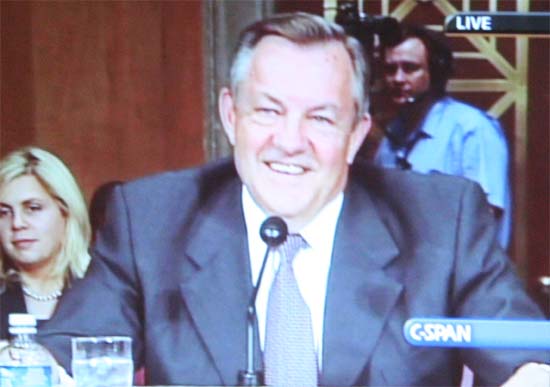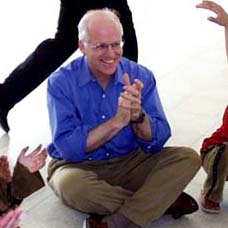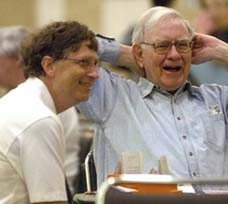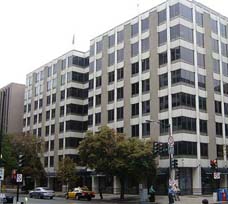2006.09.05: September 5, 2006: Headlines: Directors - Tschetter: COS - India: Congress: Nominations: Peace Corps: Statement of Ronald A. Tschetter before the Senate Foreign Relations Committee
Peace Corps Online:
Peace Corps News:
Directors of the Peace Corps:
Peace Corps Director Ron Tschetter:
Ron Tschetter: Newest Stories:
2006.09.05: September 5, 2006: Headlines: Directors - Tschetter: COS - India: Congress: Nominations: Peace Corps: Statement of Ronald A. Tschetter before the Senate Foreign Relations Committee
Statement of Ronald A. Tschetter before the Senate Foreign Relations Committee

"I will look forward to watching Peace Corps Volunteers continue to make a difference at the grassroots level abroad by fostering mutual understanding and respect, and sowing seeds of peace among other cultures. I will also stress the importance of financial accountability and spending our appropriated dollars wisely and ensure that our programming and projects reflect changing needs overseas. In addition, I hope to examine the agency’s recruiting process in order to broaden the applicant pool and better tap into the Baby Boom generation-- a rich harvestable field of potential Volunteers."
Statement of Ronald A. Tschetter before the Senate Foreign Relations Committee
Statement of Ronald A. Tschetter
Nominee - Director of the Peace Corps
Before the United States Senate Committee on Foreign Relations
September 5, 2006
INTRODUCTION
Good afternoon. I am honored to sit before you today as the President’s nominee to become the seventeenth Director of the Peace Corps. Before I begin, I would first like to thank Subcommittee Chairman Coleman and Senator Dodd, as well as the other members of the Committee, for holding today’s hearing. I would also like to thank my wife for being here, and the President, for his trust and confidence. I know the President is a firm supporter of the agency, has visited a number of Volunteers in the field, and deeply believes in the good work that Peace Corps Volunteers do around the globe. I am also grateful for the bipartisan support that many members of the Senate have expressed in support of my nomination.
Growing up in South Dakota, I learned at a young age the value of hard work and serving others. Despite the difficulties of farming on the parched South Dakotan soil, my mother and my father were prime examples of generosity. I recall on several occasions my father providing food, money, or assistance to those around us who were either less fortunate or who had faced a sudden tragedy or crisis. Those images of assisting others, regardless of our own circumstances, were ingrained in me and my six siblings at a very young age—and, have never left.
This same spirit of assistance is what led me and my wife to become Peace Corps Volunteers in 1966. Our two years in India as health Volunteers tremendously impacted our lives and gave us great insight into those living in developing countries around the world. Helping to meet the needs of peoples and communities overseas became a passion for me that has continued to this day. In fact, since my time as a Volunteer, I have returned to India five times, made numerous trips to Kenya as a member of a university council, and my wife and I have addressed various groups about our Peace Corps experience. I have also had the privilege of serving as the chairman of the National Peace Corps Association (NPCA) board of directors.
When I returned home and pursued my career in the securities industry, I gained strong management and leadership skills. I learned how to make effective budgetary decisions, provide vision, grow an organization within budgetary constraints, and enable those around me to excel. I believe that the leadership skills that I acquired in a corporate setting are readily transferable and applicable to the needs of leading a government agency such as the Peace Corps. If confirmed, I pledge to apply those skills—along with my deep passion for the mission of the agency—to my new role as Director.
GENERAL PEACE CORPS INFORMATION
In 1960, President John F. Kennedy had a powerful idea – the idea of sending Americans abroad as informal ambassadors of the United States to help make a difference in the world, and to serve their nation in the cause of peace by living and working in developing countries. By 1961, this idea became a reality with the creation of the Peace Corps.
Since the creation of the agency, Peace Corps Volunteers have been sharing peace and friendship wherever they serve, and helping the people of interested countries meet their need for trained men and women. My wife and I can attest to the difference that we made in the lives of others in India, and we also recognize how we were changed for the better through our Peace Corps service. Today, we remain in touch with many of the individuals who we met in our villages during our service.
The Peace Corps has built a solid reputation over the last 45 years both abroad and at home, and I am proud to relay to you that in 2006, over 20 countries would like to see the Peace Corps open a program within their borders, and that Americans want to serve their country by entering the Peace Corps. A recent article in USA Today, noted the willingness of Americans to serve: “College graduates, shaped by such events as Sept. 11, Hurricane Katrina and the wars in Iraq and Afghanistan, are applying to service organizations such as AmeriCorps and the Peace Corps in record numbers.”
While the Peace Corps’ mission has remained constant over its 45 years, the types of assignments have not. Peace Corps programs are designed to meet the up-to-date needs of its host countries, whether it is teaching English to its citizens, training a community in information technology, or advising young adults about HIV/AIDS prevention. The Peace Corps continues to have great success in the sectors of education, agriculture, health and HIV/AIDS, business development, environment, and youth throughout the globe.
PEACE CORPS ACCOMPLISHMENTS
This year the Peace Corps is celebrating its 45th anniversary, and I am pleased to share with you some of the key highlights of the agency and its successes over the past four and one-half decades:
The Peace Corps currently serves 69 posts representing 75 countries in Africa, Asia, the Caribbean, Latin America, Eastern Europe, Central Asia, North Africa, the Middle East, and the Pacific Islands. The agency is presently at a 30-year high with the number of Volunteers in the field. The official count for fiscal year 2005 was 7,810 Volunteers.
Over 20 percent of all Volunteers are working in predominantly Muslim countries. I believe that building understanding with the Islamic world at this time is critically important, and the Peace Corps has the special opportunity to share knowledge about Americans with the Muslim world through the personal friendships of Volunteers with their host country families, counterparts, and acquaintances. The Peace Corps has been serving in predominately Muslim countries (countries with at least 40 percent or more of its population following Islam) since its inception in 1961.
At the end of fiscal year 2005, 15.8 percent of all Peace Corps Volunteers are ethnic minorities. This is the largest number of ethnic minority Volunteers in the field since the Peace Corps started gathering official statistics in 1989. While the average age of a Volunteer is 28, the Peace Corps encourages Americans of all ages to serve their country, and today six percent of Volunteers are over 50. The oldest Volunteer currently in service is 78 years old.
I am also pleased to report that the agency continues to play a significant role in the fight against HIV/AIDS, and that it has been instrumental in carrying out the President’s Emergency Plan for AIDS Relief (Emergency Plan). Volunteers are currently active in 9 of the 15 Emergency Plan countries and approximately 90 percent of posts work directly or indirectly on HIV/AIDS activities, such as teaching HIV/AIDS awareness and prevention and providing orphan care. Additionally, a new Peace Corps Office of AIDS Relief was created in 2005 to provide overall leadership of the agency’s HIV/AIDS efforts.
A further achievement for the agency is that it is forging relationships with new countries. One such relationship is with the United States’ neighbor, Mexico. The Mexico/Peace Corps program, which opened in 2004, is a unique partnership that provides the first opportunity for the Peace Corps to recruit highly specialized, technically-trained and experienced Volunteers to work side-by-side with their Mexican counterparts. To date, the program has been very successful and additional Volunteers have been requested by the Mexican government.
Another country that the agency has formed a partnership with is the Kingdom of Cambodia. Our office in Cambodia is now open, and Volunteers are expected to arrive in early 2007. This will be the first time that the Peace Corps will be operating in Southeast Asia, and I look forward, if confirmed, to working with the host country government to ensure that Volunteers are able to make a lasting impact.
Other notable achievements include: the financial compliance of the agency. For the first time in its 45-year history, the Peace Corps recently prepared comparative financial statements that comply, to the extent possible, with Office of Management and Budget (OMB) guidelines and the Accountability of Tax Dollars Act of 2002. The agency also recently received an “effective” PART rating from the OMB. This is the highest rating an agency can achieve. Programs rated at the “effective” level set ambitious goals, achieve results, are well-managed, and improve efficiency. These are important financial initiatives that I am committed to continuing as Director.
The few Peace Corps’ accomplishments I have named provide a marvelous platform for the agency as it meets the challenges of the 21st century, and reflects the solid work of this Administration and my predecessor, Gaddi H. Vasquez, in maintaining the integrity of the Peace Corps and advancing its goals.
I would now like to address a topic of great importance to me: the safety and security of the Volunteers in the field. The safety and security of Volunteers is, and will remain under my leadership should I be confirmed, the agency’s number one priority. I am happy to relay that the safety and security data for 2005 indicates a 10 percent reduction in crimes against Volunteers such as rape, aggravated assault, burglary, and theft from the previous year.
As Director, I will continue to ensure that safety and security issues are fully integrated in all aspects of Volunteer recruitment, training, and service. A separate Office of Safety and Security was established in 2002 to foster improved communications, coordination, oversight, and accountability for all of the Peace Corps’ safety and security efforts, and I will do my part in ensuring it is run effectively.
Throughout their service, Volunteers develop skills and receive up-to-date information that help them understand their surroundings, cope with unwanted attention, and develop personal safety strategies. With language, cross-cultural, and health and safety instruction, Volunteers learn about their environment and are shown how to effectively cope with the many challenges they will face.
Finally, I would also like to note that measures have been taken to protect Volunteers from any possible outbreak of avian flu. All Volunteers have been given a flu vaccination, and posts have received the needed number of boxes of Tamiflu should an outbreak occur. Emergency Action Plans have also been updated appropriately.
VISION FOR THE FUTURE
Arriving in a new organization always energizes me and I look forward to planning ahead for the next generation of Peace Corps Volunteers, while at the same time not compromising the 45-year mission of the Peace Corps or its three goals:
* To help the people of interested countries in meeting their need for trained men and women.
* To help promote a better understanding of Americans on the part of the peoples served.
* To help promote a better understanding of other peoples on the part of Americans.
Much has changed over the last 45 years -- Volunteers, countries, and challenges -- but the Peace Corps three goals have not. My commitment, if confirmed, is to see that the Volunteers know and are motivated to fulfill all three goals.
I will look forward to watching Peace Corps Volunteers continue to make a difference at the grassroots level abroad by fostering mutual understanding and respect, and sowing seeds of peace among other cultures. I will also stress the importance of financial accountability and spending our appropriated dollars wisely and ensure that our programming and projects reflect changing needs overseas. In addition, I hope to examine the agency’s recruiting process in order to broaden the applicant pool and better tap into the Baby Boom generation-- a rich harvestable field of potential Volunteers.
CLOSING
Mr. Chairman, should I be confirmed by the Senate, I will do my absolute best to make the Volunteer experience a safe and successful one, to meet the needs of our host country counterparts, and to ensure that every agency dollar is used carefully and thoughtfully.
Thank you. I am now pleased to answer any questions you may have.
When this story was posted in September 2006, this was on the front page of PCOL:





Peace Corps Online The Independent News Forum serving Returned Peace Corps Volunteers
 | Chris Shays Shifts to Favor an Iraq Timetable
In a policy shift, RPCV Congressman Chris Shays, long a staunch advocate of the Bush administration's position in Iraq, is now proposing a timetable for a withdrawal of American troops. How Mr. Shays came to this change of heart is, he says, a matter of a newfound substantive belief that Iraqis need to be prodded into taking greater control of their own destiny under the country’s newly formed government. As Chairman of the House Government Reform subcommittee on national security, he plans to draft a timetable for a phased withdrawal and then push for its adoption. A conscientious objector during the Vietnam War who said that if drafted he would not serve, Chris Shays has made 14 trips to Iraq and was the first Congressman to enter the country after the war - against the wishes of the Department of Defense. |
 | Peace Corps' Screening and Medical Clearance
The purpose of Peace Corps' screening and medical clearance process is to ensure safe accommodation for applicants and minimize undue risk exposure for volunteers to allow PCVS to complete their service without compromising their entry health status. To further these goals, PCOL has obtained a copy of the Peace Corps Screening Guidelines Manual through the Freedom of Information Act (FOIA) and has posted it in the "Peace Corps Library." Applicants and Medical Professionals (especially those who have already served as volunteers) are urged to review the guidelines and leave their comments and suggestions. Then read the story of one RPCV's journey through medical screening and his suggestions for changes to the process. |
 | Gates charity races to spend billions
Warren E. Buffett’s gift of $31 billion to the Bill and Melinda Gates Foundation means that for tax reasons, starting in 2009, the foundation must distribute $3 billion annually, or a little more than twice what it distributed last year.
PCOL Comment: The Foundation says that "preventing the spread of HIV is the most durable long-term solution to the AIDS epidemic, and a top priority for the foundation." Peace Corps Volunteers and Returned Volunteers have been doing just that in AIDS Education for the past 15 years. Why not consider a $100M annual contribution to the Peace Corps to put 2,500 additional volunteers in the field to expand AIDS education worldwide? |
 | The Peace Corps is "fashionable" again
The LA Times says that "the Peace Corps is booming again and "It's hard to know exactly what's behind the resurgence." PCOL Comment: Since the founding of the Peace Corps 45 years ago, Americans have answered Kennedy's call: "Ask not what your country can do for you--ask what you can do for your country. My fellow citizens of the world: ask not what America will do for you, but what together we can do for the freedom of man." Over 182,000 have served. Another 200,000 have applied and been unable to serve because of lack of Congressional funding. The Peace Corps has never gone out of fashion. It's Congress that hasn't been keeping pace. |
 | Changing the Face of Hunger
In his new book, Former Congressman Tony Hall (RPCV Thailand) says humanitarian aid is the most potent weapon the United States can deploy against terrorism. An evangelical Christian, he is a big believer in faith-based organizations in the fight against hunger. Members of Congress have recently recommended that Hall be appointed special envoy to Sudan to focus on ending the genocide in Darfur. |
 | PC will not return to East Timor in 2006
Volunteers serving in East Timor have safely left the country as a result of the recent civil unrest and government instability. Latest: The Peace Corps has informed us that at this time, the Peace Corps has no plans to re-enter the country in 2006. The Peace Corps recently sent a letter offering eligible volunteers the opportunity to reinstate their service in another country. |
 | Chris Dodd considers run for the White House
Senator Chris Dodd plans to spend the next six to eight months raising money and reaching out to Democrats around the country to gauge his viability as a candidate. Just how far Dodd can go depends largely on his ability to reach Democrats looking for an alternative to Hillary Clinton. PCOL Comment: Dodd served as a Volunteer in the Dominican Republic and has been one of the strongest supporters of the Peace Corps in Congress. |
 | Peace Corps stonewalls on FOIA request
The Ashland Daily Tidings reports that Peace Corps has blocked their request for information on the Volkart case. "After the Tidings requested information pertaining to why Volkart was denied the position — on March 2 — the newspaper received a letter from the Peace Corps FOIA officer stating the requested information was protected under an exemption of the act." The Dayton Daily News had similar problems with FOIA requests for their award winning series on Volunteer Safety and Security. |
 | PCOL readership increases 100%
Monthly readership on "Peace Corps Online" has increased in the past twelve months to 350,000 visitors - over eleven thousand every day - a 100% increase since this time last year. Thanks again, RPCVs and Friends of the Peace Corps, for making PCOL your source of information for the Peace Corps community. And thanks for supporting the Peace Corps Library and History of the Peace Corps. Stay tuned, the best is yet to come. |
 | History of the Peace Corps
PCOL is proud to announce that Phase One of the "History of the Peace Corps" is now available online. This installment includes over 5,000 pages of primary source documents from the archives of the Peace Corps including every issue of "Peace Corps News," "Peace Corps Times," "Peace Corps Volunteer," "Action Update," and every annual report of the Peace Corps to Congress since 1961. "Ask Not" is an ongoing project. Read how you can help. |
 | RPCV admits to abuse while in Peace Corps
Timothy Ronald Obert has pleaded guilty to sexually abusing a minor in Costa Rica while serving there as a Peace Corps volunteer. "The Peace Corps has a zero tolerance policy for misconduct that violates the law or standards of conduct established by the Peace Corps," said Peace Corps Director Gaddi H. Vasquez. Could inadequate screening have been partly to blame? Mr. Obert's resume, which he had submitted to the Peace Corps in support of his application to become a Peace Corps Volunteer, showed that he had repeatedly sought and obtained positions working with underprivileged children. Read what RPCVs have to say about this case. |
 | Why blurring the lines puts PCVs in danger
When the National Call to Service legislation was amended to include Peace Corps in December of 2002, this country had not yet invaded Iraq and was not in prolonged military engagement in the Middle East, as it is now. Read the story of how one volunteer spent three years in captivity from 1976 to 1980 as the hostage of a insurrection group in Colombia in Joanne Marie Roll's op-ed on why this legislation may put soldier/PCVs in the same kind of danger. Latest: Read the ongoing dialog on the subject. |
Read the stories and leave your comments.

Some postings on Peace Corps Online are provided to the individual members of this group without permission of the copyright owner for the non-profit purposes of criticism, comment, education, scholarship, and research under the "Fair Use" provisions of U.S. Government copyright laws and they may not be distributed further without permission of the copyright owner. Peace Corps Online does not vouch for the accuracy of the content of the postings, which is the sole responsibility of the copyright holder.
Story Source: Peace Corps
This story has been posted in the following forums: : Headlines; Directors - Tschetter; COS - India; Congress; Nominations
PCOL34338
68
























